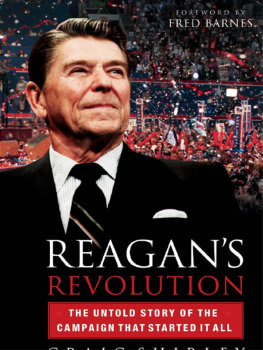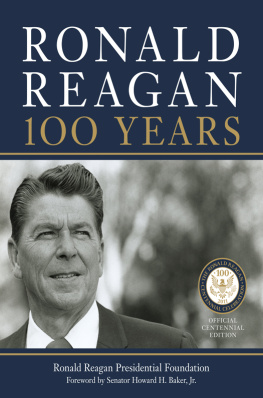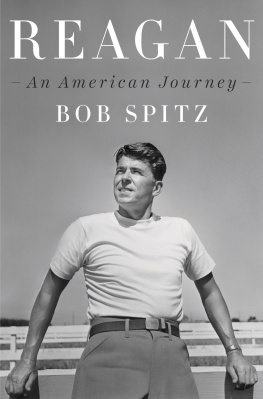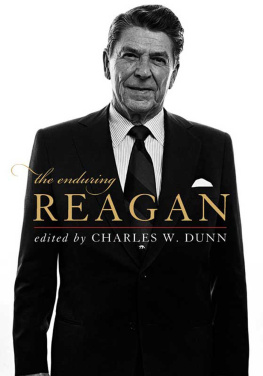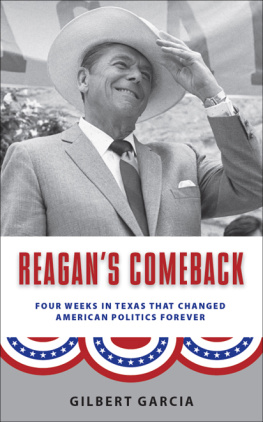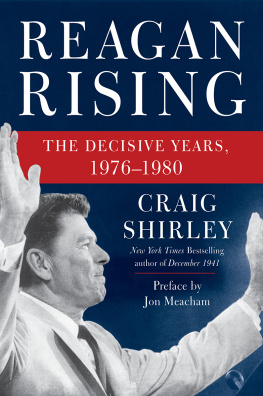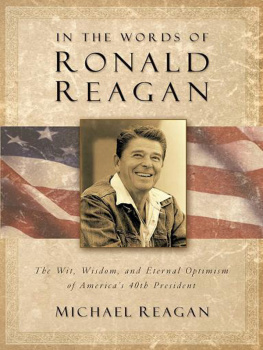Contents
For Zorine, my wife, my love, my best friend, my rock, the center of all things for me.
And the best editor and confidante ever.
by Jon Meacham
It began, as is so often the case, with an ending. At the 1976 Republican National Convention in Kansas City, Ronald Reaganformer sportscaster, movie actor, union president, and governor of Californiahad come up just short of defeating the incumbent president, Gerald R. Ford, to win their partys nomination. On the day he was heading home from Missouri to California, Reagan said a few words to gathered staff and supporters. We lost, but the causethe cause goes on, he said, quoting an old ballad: Ill lay me down and bleed awhile; although I am wounded, I am not slain. I shall rise and fight again.
Truer words have rarely been spoken in American politics. To some, at sixty-five (a greatly advanced age in the context of the times, the year of standard retirement), Reagan seemed to have missed his chance at history. To others (including to himself), the eternally optimistic Dutch Reagan, a son of the Midwest who became an emblem of Sunbelt possibility and prosperity, was only getting started. He believed in himself and in his ideas and in the reality of destiny, and he would not give up.
In the following pages, Craig Shirley continues his own monumental project of chronicling what shall most likely come to be known as the Age of Reagan. In accounts of the 1976 and 1980 campaigns, as well as of the former presidents long good-bye in the twilight of Alzheimers, Shirley, a historian and practitioner of politics, brings a deep love of detail and a romantics passion for narrative to the task of capturing the how and the why of Reagan. The present project is to explore what Winston Churchill, in his own case, thought of as the wilderness years, the excruciating interval in which the principal was without power but was driven forward, through the thickets, by the enduring conviction that he was right after all.
As usually told, the Reagan saga skips from the near-miss in Kansas City to the triumph of 1980, when Reagan fought off a surprisingly strong George H. W. Bush in the primaries, won the nomination in Detroit, nearly offered the vice presidency to the defeated Ford, and then buried Jimmy Carter in a landslide after a reassuring debate performance in Cleveland a week before the voting.
The virtue of Shirleys Reagan Rising lies in the authors insistence that the popular version of, well, Reagans rise is incomplete without an understanding of the heros four years in California between the 1976 and 1980 campaigns. Here is a portrait of an America that was in many ways suffering a kind of nervous breakdownhigh inflation, punishing interest rates, fear of Soviet advances, and the debilitating Iranian hostage crisis. Here, too, is a portrait of a man biding his time, learning, watching, and preparing for his momenta moment that, truth be told, not many people in real time thought would ultimately come.
The great New York columnist Murray Kempton once remarked that the better story is in the losers locker room. Shirley shares that view, and his unique viewpoint as a conservative in the arena gives his histories a palpable immediacy and authenticity. You will find the ensuing account of Reagan, in his short tenure as a loser, compelling, thorough, and convincing.
Back in Kansas City, on the final night of the convention, Gerald Ford, in a characteristic act of grace, invited Nancy and Ronald Reagan to come to the podium after the presidents own acceptance speech. The last word of the evening, then, belonged not to Ford but to Reagan.
If I could just take a moment, Reagan said on that distant summer night, I had an assignment the other day. Someone asked me to write a letter for a time capsule that is going to be opened in Los Angeles a hundred years from now. Reagan thought it would be a simple matter, he said, but it proved more difficult than he had anticipated. Then as I tried to writelet your own minds turn to that task, Reagan said. You are going to write for people a hundred years from now, who know all about us. We know nothing about them. We dont know what kind of a world they will be living in.
We now know what kind of a world President Reagan left us. Craig Shirleys fine book tells us much about the moment that summoned him to greatness, and the man who answered that call. Its a story we all need to know.
And for conservatives, it was their Camelot.
As historian Doug Brinkley once told me, the world of Ronald Reagan scholarship is just beginning to open up. Though over a thousand books have been written about the Gipper, there remain unreported or underreported aspects to his monumental life and times. Many of these books, written by people with an agenda, are quite bad. Others, written by objective historians, are quite good. History is already sorting out the factual from the farcical.
My first book, Reagans Revolution, was on his failed but vitally important and historic 1976 campaign, and Rendezvous with Destiny was primarily about his successful 1980 campaign for president. When researching and writing Rendezvous between 2006 and 2009, it dawned on me that Id given only a cursory glance to these four wilderness years for the Gipper. What happened in those four years to prepare him in a way that he was not prepared for 1976? How did he gain so much momentum between failing and winning? Surely the reason for his popularity was more than just taking on issues, taking on Jimmy Carter, and being present and accounted for. What else was there? These questions and others were always at the back of my mind when writing about the 1980 election.
This is why I decided to focus this book on the all-important details of Reagans growth and political maturation and seasoning in the years of late 1976 to late 1979, as he emerged from his losing campaign to wrest the Republican nomination away from Gerald Ford and moved to yet another grab at the brass ring in 1980. Unlike most men, who arrive at a settled worldview in their thirties and forties, Reagan was dynamic, not static, and his position and views kept becoming more refined, intellectual, and nuanced, even into his fifties and sixties. In 1975, in an interview with Reason magazine, he said that he believed the very heart and soul of conservatism is libertarianism, and then launched into a detailed explanation for his belief.
But thats not all. Coming to power in London was Margaret Thatcher, and in Rome was Pope John Paul II. Also Mikhail Gorbachev was rising in several short years in the Soviet Union, though, in the late 1970s, the gangster Leonid Brezhnev still ruled with an iron fist. All these people and events would have a profound effect on Reagan, America, and the world.
So much happened in America, the world, and to him that little can be overlooked as he mulled over his third and final run for the GOP nomination. These truly were decisive years as he honed and sharpened his philosophy, which gave intellectual underpinnings to his pro-freedom, anti-Communist message. Working against him was the fact that he was a two-time loser and he would be sixty-nine years old in 1980, and many Americans, sometimes a majority, thought he was too old to handle the burdens of being president.
The late 1970s saw the reemergence of the Committee on the Present Danger, which first highlighted the Communist threat in the early 1950s, led this time around by Dick Allen and Jeane Kirkpatrick and Ken Adelman, which put important sunlight on the Soviet threat. Dr. Kirkpatrick had written a vitally important article, Dictators and Double Standards, which Reagan read avidly and which piqued his interest in how actually to defeat the Soviet Union. The article became a must read inside the conservative movement and established Kirkpatrick as a future star.


